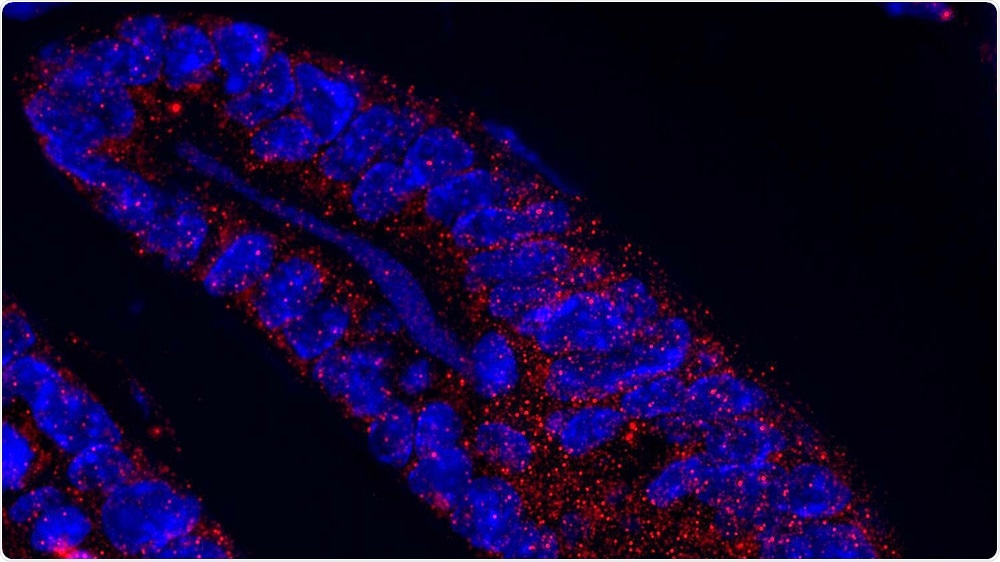An international group of scientists from the University of Zurich, the University Hospital Zurich, Heidelberg, and Glasgow have discovered a new function of MCL1, the protein that regulates cell death.

The protein MCL1 (red dots) within the small intestine of a healthy mouse. The nuclei of individual cells (blue) are also visible. Image Credit: Marc Healy, UZH.
This protein is crucial for safeguarding the intestine from the development of cancer—not dependent on bacteria-induced inflammation. The study results could help use MCL1 inhibitors, which are now being tested for the treatment of cancer.
Colorectal carcinoma (CRC) is one of the most prevalent forms of intestinal cancer and is also the second major cause of cancer-related mortality across the world. Although a few patients exhibit a genetic predisposition to this disease, most of the cases occur at irregular intervals and are largely influenced by the growing “Western lifestyle,” which includes physical inactivity, obesity, and poor diet.
A study published recently offers new insights into how this disease develops: An international research team made use of genetically modified mice to show that the MCL1 protein is crucial for maintaining intestinal homeostasis and thus safeguarding against intestinal cancer formation.
The study was headed by Achim Weber, Professor at the Institute of Molecular Cancer Research of the University of Zurich and the Institute of Pathology and Molecular Pathology of the University Hospital Zurich, in partnership with scientists from the German Cancer Research Center in Heidelberg and the Beatson Institute in Glasgow, Scotland.
MCL1 protein protects the intestine against cancer
As part of the study, the researchers altered the genetic composition of mice such that the intestinal cells of the animals no longer synthesized the MCL1 protein. In general, this protein inhibits apoptosis and helps to maintain the optimal balance of new and dying cells in the intestinal mucosa.
The deprivation of MCL1 led to irreversible damage to the intestine and the ensuing formation of intestinal tumors. Analogous changes can also be seen in the intestine of people suffering from chronic intestinal inflammation, where there occurs a higher risk of developing intestinal cancer.
Tumors also develop without bacterial-driven inflammation
For a long time, it was thought that microbiota-induced chronic intestinal inflammation plays a major role in the development of intestinal cancer.
What’s remarkable, however, is that the loss of MCL1 can drive intestinal cancer even without bacteria-driven inflammation.”
Achim Weber, Professor, Institute of Molecular Cancer Research, University of Zurich
This was shown by conducting experiments in which mice that lacked the MCL1 protein were held in a germfree environment.
This means that the loss of certain genes is apparently enough to cause intestinal cancer – even in the absence of inflammation. This groundbreaking finding significantly furthers our understanding of the critical early steps associated with intestinal cancer development.”
Achim Weber, Professor, Institute of Molecular Cancer Research, University of Zurich
Treating cancer with MCL1 inhibitors is like walking a tightrope
Another surprising outcome was that in certain types of tumors—such as colorectal carcinoma—the quantity of MCL1 is higher rather than thought. Scientists had made predictions that these tumors increase the production of MCL1 to be beneficial for survival and allow them to better resist the traditional treatment methods. Consequently, several new therapies to inhibit and minimize the function of MCL1 are now on trial.
However, the outcomes of the study reveal that apart from overexpression, even the deficiency of MCL1 can be destructive. There is a higher chance that even a temporary loss of MCL1 function can trigger a disturbance of the intestinal mucosa and the initial stages of tumor development.
The regulation of this protein is like walking a tightrope. Our study therefore urges an element of caution when it comes to using MCL1 inhibition in cancer therapy.”
Marc Healy, Study First Author, University of Zurich
Source:
Journal reference:
Healy, M. E., et al. (2020) MCL1 is Required for Maintenance of Intestinal Homeostasis and Prevention of Carcinogenesis in Mice. Science Direct. doi.org/10.1053/j.gastro.2020.03.017.